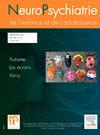儿童精神科医生照顾青春期前性别不一致儿童的经验:IPSE定性研究
Q4 Medicine
Neuropsychiatrie de l''Enfance et de l''Adolescence
Pub Date : 2025-09-01
DOI:10.1016/j.neurenf.2025.06.006
引用次数: 0
摘要
儿童性别焦虑是一个相对较新的概念,诊断标准经常受到批评。这些病例的管理仍然具有挑战性,通常需要在专业团队中进行多学科讨论:目前没有共识,方法的异质性受到许多伦理和意识形态问题的支持。临床表现的多样性,加上高合并症率,迫使临床医生处理复杂的诊断和治疗挑战。在这种特殊情况下,更好地理解精神病学随访的作用和地位似乎是相关的。目的深入探讨和描述儿童精神科医生参与12岁以下儿童护理、性别不一致咨询的生活经验。这种探索性方法旨在提出具体的建议,以提高这些儿童的护理质量,并了解这些儿童精神科医生面临的挑战。方法选择是一项多中心回顾性探索性研究,于2021年至2023年进行,基于对12名法语儿童精神病学家的半结构化访谈,这些精神病学家使用医学定性研究引入的IPSE方法遇到了青春期前性别不一致的儿童。IPSE方法使用建构主义范式和现象学和经验方法。招募遵循有目的抽样的原则,一直持续到数据饱和。使用NVIVO软件进行数据分析,包括描述性个体阶段和群体结构阶段。结果归纳分析揭示了临床医师体验的三个主轴结构。第一个轴关注儿童精神科医生的社会经验以及精神病学与社会之间的相互作用,在社会中有医学禁令,在医学中有社会禁令。第二个轴与亲密体验及其在临床实践中的影响有关。最后,第三个轴质疑儿童精神科医生的伦理经验,探索如何在受到内部和外部因素影响的重大风险时有效地开展工作。结论:儿童精神科医生的经历深受政治、社会和社会问题的影响,这些问题超出了医学问题和他们与患者一起工作的主体间性维度。儿童精神科医生必须在满足即时期望和支持儿童的身份发展之间找到平衡。社会挑战使这一过程变得复杂,研究结果表明,这些紧张关系可能会阻碍他们对孩子和家庭的照顾。本文章由计算机程序翻译,如有差异,请以英文原文为准。
L’expérience vécue des pédopsychiatres amenés à prendre en charge des enfants prépubères avec incongruence de genre : une étude qualitative IPSE
Introduction
Gender dysphoria in children is a relatively recent concept with often criticized diagnostic criteria. Management of these cases remains challenging and typically follows multidisciplinary discussions within specialized teams: there is currently no consensus, and the heterogeneity of approaches is underpinned by numerous ethical and ideological questions. The diversity of clinical presentations, coupled with high comorbidity rates, force the clinician to deal with complex diagnostic and therapeutic challenges. It seems relevant to better understand the role and place of psychiatric follow-up in this specific context.
Objective
To deeply explore and describe the lived experiences of child psychiatrists involved in the care of children under 12 years old, consulting for gender incongruence. This exploratory approach aims to propose concrete recommendations for improving the quality of care for these children and to understand the challenges these child psychiatrists face.
Method
CHOICE is a multicentric and retrospective exploratory study, conducted between 2021 and 2023, based on semi-structured interviews with 12 French-speaking child psychiatrists who encountered prepubescent children with gender incongruence using the IPSE method introduced for qualitative research in medicine. The IPSE method uses a constructivist paradigm and a phenomenological and experiential approach. Recruitment, following the principle of purposive sampling, continued until data saturation was reached. Data analysis, consisting of a descriptive individual phase and a group structuring phase, was carried out using NVIVO software.
Results
The inductive analysis revealed a clinician experience structured around three main axes. The first axis focused on the social experience of child psychiatrists and the interaction between psychiatry and society, where there was a medical injunction within the societal and a societal injunction within the medical. The second axis related to the intimate experience and its impact in clinical practice. Finally, the third axis questioned the ethical experience of child psychiatrists, exploring how to perform their work effectively when there is a significant risk of being influenced by both internal and external factors.
Conclusion
The experiences of child psychiatrists emerge as being deeply influenced by political, social and societal issues that go beyond medical questions and the intersubjective dimension that plays out in their work with patients. Child psychiatrists must find a balance between the answer to immediate expectations and supporting the child's identity development. Societal challenges make this process complex, and the study's findings show that these tensions can hinder the care of the children and families they encounter.
求助全文
通过发布文献求助,成功后即可免费获取论文全文。
去求助
来源期刊

Neuropsychiatrie de l''Enfance et de l''Adolescence
Medicine-Pediatrics, Perinatology and Child Health
CiteScore
0.60
自引率
0.00%
发文量
61
期刊介绍:
Organ of the Société française de psychiatrie de enfant et de adolescent, Neuropsychiatrie de enfance et de adolescence tackles all fields of child-adolescent psychiatry and offers a link between field and clinical work. As a reference and training tool for students and practitioners, the journal publishes original papers in child psychiatry as well as book reviews and conference reports. Each issue also offers a calendar of the main events dealing with the speciality.
 求助内容:
求助内容: 应助结果提醒方式:
应助结果提醒方式:


